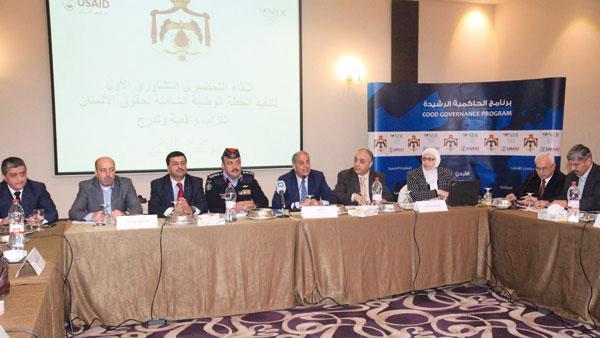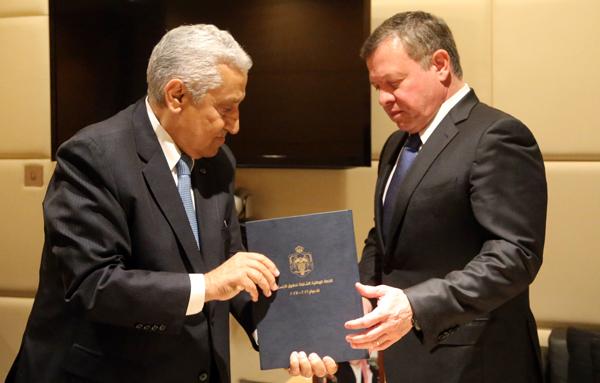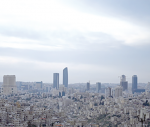You are here
'Gov't seeks cooperation of civil society in human rights plan'
By Rana Husseini - Mar 26,2016 - Last updated at Mar 26,2016

Officials and civil society representatives attend a meeting to discuss the national human rights plan, in Amman, on Saturday (Petra photo)
AMMAN — Local and international organisations on Saturday met with government officials to discuss a two-year comprehensive national plan on human rights, which the government sees as a roadmap created through a participatory approach.
“Our first of many meetings today is to connect with the local and international organisations to hear their points of view about the plan and any other points to be included in it,” said the government’s coordinator on human rights, Basil Tarawneh.
Tarawneh added that the meeting was aimed to explore the potential for any organisation that would like to be part of the follow-up entity on the implementation of the plan.
Dozens of activists, human rights officials, diplomats and members of the committee that drafted the national plan attended the meeting, held in cooperation with the National Democratic Institute and USAID.
“We want to explore the best means to implement the plan with our partners in civil society, and at the same time take into consideration any changes that could occur over the next two years to work smartly and with flexibility,” Tarawneh added.
The plan was created in accordance with sources that included Sharia (Islamic law), the Constitution, international and regional conventions, and remarks presented by the National Centre for Human Rights (NCHR).
The plan has primary and secondary goals whose achievement will be measured through a set of activities and indicators, and the committee will be reviewing the strategy on a regular basis.
The government — which drafted the plan in cooperation with the NCHR, civil society institutions and professional associations — will implement it through its concerned departments and civil society institutions.
Tarawneh explained that the plan includes a vision of a society based on justice and protecting human rights and dignity.
The plan focuses on civil and political rights such as the right of life and physical safety; ensuring the independence of the judiciary and fair trials; the right of citizenship, residency and freedom of mobility; and enhancing the freedom of speech and expression; and the rights of assembly and forming political parties, unions and societies.
On the economic, social and cultural rights, the comprehensive plan stressed the need to protect the rights to work, healthcare and education.
The third aspect is protecting the rights of vulnerable groups.
Officials from various ministries and other entities, such as the Public Security Department, stressed during the meeting that they have already distributed the plan to their personnel for use in their work.
During the meeting, some civil society organisations voiced their objections to accusations of “being Western agents”.
“We always hear accusations that we are working with Western agencies, but no one says anything when the government works with them, and — at the same time — the government stays silent over the accusations against us,” charged Nidal Mansour, president of the Centre for Defending Freedom of Journalists.
Other activists charged that the government is tightening its grip on civil society with claims that these organisations “should obtain permission before holding any activity — a practice that did not exist in the past”.
Tarawneh stressed at the end of the two-hour meeting that the government will “continue to adopt transparency in dealing with human rights issues through true partnership with civil society to address negative aspects”.
Earlier this month, His Majesty King Abdullah received the plan from the government and expressed his keenness to protect and enhance human rights in Jordan, stressing the significance of implementing the plan according to the set timeline.
King Abdullah pointed out that the plan and its objectives are part of the national comprehensive reform process, urging those in charge of implementation to build on previous achievements in terms of citizen empowerment and safeguarding public rights and freedoms.
Related Articles
AMMAN — His Majesty King Abdullah on Wednesday expressed keenness to protect and enhance human rights in Jordan, highlighting the importance
AMMAN — A number of civil society institutions are lacking democratic aspects and principles of good governance, including participation, ac
AMMAN — The government on Wednesday stressed the need to strengthen collaboration with civil society to safeguard human rights in the Kingdo
















